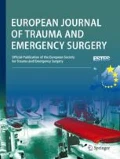The World Health Organization (WHO) has identified trauma as the major health care challenge of our century, claiming more productive life years worldwide than any other disease [1]. In the European Union (EU), injury accounts for 15 % of all deaths before the age of 60 years and is the fourth most common cause of death, with more than 235,000 deaths each year from injuries, equating to 600 injury fatalities per day [2]. In children, adolescents and young adults, accident and injury rates are even higher, being the leading cause of death in these age groups.
Mortality from trauma in the EU has fallen 20 % in the past 20 years, to a rate of 63.7 per 100,000 in 2010 [3]. This reduction is partly due to primary injury prevention, but indicates a significant contribution of improved emergency health care services. Despite improvements in both primary and secondary injury prevention, the WHO estimate that the mortality of major trauma in Europe could be decreased by a further 30 % by improving the chain of care for major trauma patients [2].
Crucial links in this chain are effective hospital trauma teams responsible for the initial assessment and management of trauma patients. The concept of trauma teams is well established in most European countries, requiring different medical specialties and non-medical professions to work seamlessly together under significant time pressures in order to achieve the best possible patient outcome. The main attributes of successful trauma teams are competent team members, leadership, excellent communication and cooperation [4, 5]. The unmet need for a corresponding training programme has prompted the European Resuscitation Council (ERC) to launch the European Trauma Course (ETC) project in cooperation with the European Society of Anaesthesiology (ESA), the European Society for Trauma and Emergency Surgery (ESTES) and the European Society for Emergency Medicine (EuSEM). An international group of clinical experts in trauma care and medical education was appointed to develop the course and, after 3 years of developmental work and four pilot courses, the first ETC was held at the 2008 ERC meeting in Ghent, Belgium.
The ETC is an innovative, multi-disciplinary 2.5-day course aimed at doctors and allied health care professionals involved in the initial care of severely injured patients. The novel modular course concept is scenario-based and provides state-of-the art team training through workshops and skill stations, reflecting prevailing European practice. Twenty-four candidates, in teams of four (doctors from all specialties, nurses, paramedics), are taken through 30 progressive trauma admission scenarios, with a strong focus on teamwork, communication and non-technical skills. The modules cover all major aspects of trauma resuscitation. Two lectures and two patient demonstrations complement the course, keeping didactic teaching to a minimum. Candidate assessment is performed continuously as well as in a summative way at the end of the course.
For workshops, the candidates are grouped in teams of four and assume the roles of a trauma team leader and team members. The roles are rotated amongst candidates after each scenario, giving all participants the opportunity to understand and practice each function within a trauma team. Two instructors guide each workshop.
The first day of the course focuses mainly on identifying and treating immediately life-threatening airway, breathing or circulatory trauma conditions during a primary survey. On the second day, the participants deal with assessments of the whole body (secondary survey), specific body areas (e.g. abdomen, head, spine), and special patients (e.g. paediatrics, pregnancy). On the final day, the summative assessment takes place. All candidates are required to successfully complete at least one scenario as a team leader.
Since its launch in 2008, the programme has grown exponentially; more than 2,000 doctors and allied health care professionals now having been trained. There are 65 European courses for 1,560 candidates planned for 2013 alone. The publication of the re-written third edition of the course manual is scheduled for November 2013. The great success of the ETC programme has encouraged the four partner organisations to further formalise their cooperation and to set up the European Trauma Course Organisation (ETCO) to take on the management and further development of the ETC programme. The ETCO is now an international charity registered in Belgium, hosted by the ERC. The main goals of the ETCO are further development, quality control and the international implementation of the ETC.
We believe that the unparalleled success of this course is due to its focus on teamwork, communication and non-technical skills, together with its emphasis on practical rather than didactic teaching. It is likely to see further rapid uptake across Europe, where we hope to see it established as a key requirement for health care teams involved in the initial management of severely injured patients, thereby contributing to the WHO goals of further reducing avoidable deaths from trauma.
References
Global Forum on Trauma Care. World Health Organization (WHO), Rio de Janeiro, Brazil, 28–29 October 2009.
Injuries in the European Union. Summary 2002–2004. http://ec.europa.eu/health/archive/ph_determinants/environment/ipp/documents/injurieseu_sum_en.pdf.
The European health report. http://www.euro.who.int/__data/assets/pdf_file/0003/184161/The-European-Health-Report-2012,-FULL-REPORT-w-cover.pdf.
Østergaard HT, Østergaard D, Lippert A. Implementation of team training in medical education in Denmark. Qual Saf Health Care. 2004;13:i91–5.
Berlin JM, Carlström ED. The 20-minute team—a critical case study from the emergency room. J Eval Clin Pract. 2008;14:569–76.
Conflict of interest
None.
Author information
Authors and Affiliations
Corresponding author
Additional information
All authors are board members of the European Trauma Course Organisation.
Rights and permissions
About this article
Cite this article
Thies, KC., Deakin, C.D., Rommens, P.M. et al. The European trauma course: trauma teaching goes European. Eur J Trauma Emerg Surg 39, 441–442 (2013). https://doi.org/10.1007/s00068-013-0317-z
Received:
Accepted:
Published:
Issue Date:
DOI: https://doi.org/10.1007/s00068-013-0317-z

